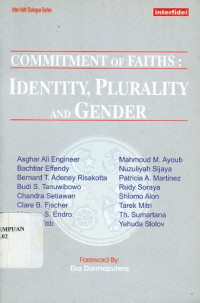
Text
Commitment of faiths: identity, plurality and gender
The past two decades has undoubtedly seen an increase in the study of the links between spirituality, religiousness and psychological adjustment. The relationship of religiosity (the attendance, belief and practice of one’s religion and rituals) and quest (the process of existential. and religious questioning and pursuit of its understanding) has been insignificantly studied in psychology from an identity status perspective. Further, Sandage, Jankowski, & Link (2010) discussed the lack of empirical investigation in the study of spiritual and religious change; especially in adulthood. With the exception of a few studies (Leak, 2009; Fulton 1997; Mosher & Handal, 1997) study, no psychological research has attempted to understand the relationship between religious commitment and identity formation from an Eriksonian perspective. Besides, it is noted that in the psychology literature, there appears to be nominal incorporation and documentation of the role played by culture and diverse philosophical and spiritual teachings (Nagai, 2007).This study attempts to further investigate the relationship between religiosity, “Gender is socially constructed and sex is biological” I said that every time someone ask me what is the difference between gender and sex, also after a deep sigh I add “but is not that simple”….as I said on my last post, I don’t feel comfortable anymore with certain terms and its definitions, since I started the MA in Gender and Development, the definition has been contested in several times, widening, shortening, diversifying and invalidating its meaning, especially the gender term.
Availability
| KP.II-00098 | KP.II SUM C | My Library | Available |
Detail Information
- Series Title
-
Inter-faith Dialogue Series
- Call Number
-
KP.II SUM c
- Publisher
- Yogyakarta : Institut DIAN/Interfidei., 2002
- Collation
-
xxxi, 293 hlm. ; 21 cm
- Language
-
English
- ISBN/ISSN
-
979-8726-19-7
- Classification
-
KP.II
- Content Type
-
-
- Media Type
-
-
- Carrier Type
-
-
- Edition
-
First,Februari 2002
- Subject(s)
- Specific Detail Info
-
-
- Statement of Responsibility
-
-
Other version/related
No other version available
File Attachment
Comments
You must be logged in to post a comment
 Computer Science, Information & General Works
Computer Science, Information & General Works  Philosophy & Psychology
Philosophy & Psychology  Religion
Religion  Social Sciences
Social Sciences  Language
Language  Pure Science
Pure Science  Applied Sciences
Applied Sciences  Art & Recreation
Art & Recreation  Literature
Literature  History & Geography
History & Geography